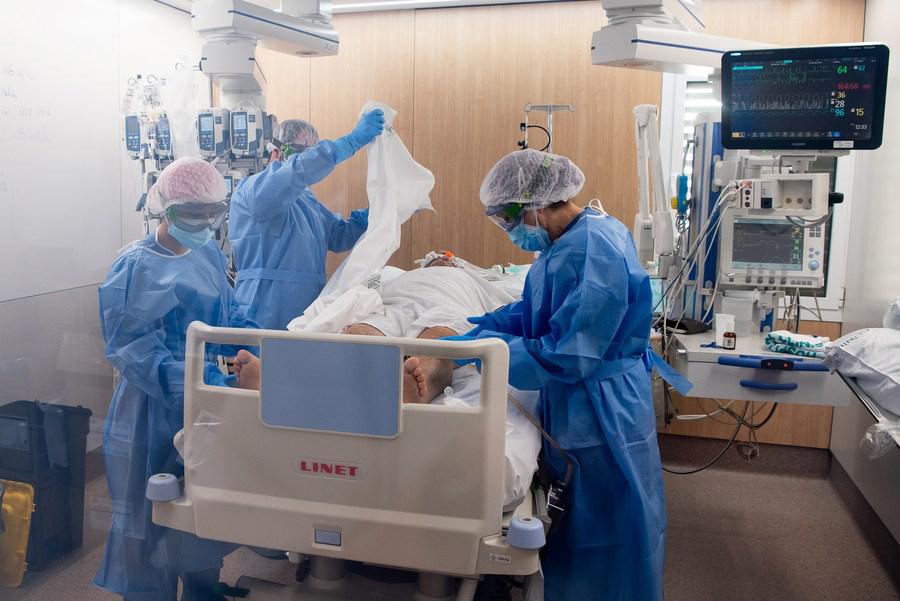Spanish researchers find link between epigenetic factors, COVID-19

Medical workers treat COVID-19 patients at a hospital in Barcelona, Spain, April 8, 2021. (Photo by Francisco Avia/Xinhua)
"We found that there were epigenetic variations, the chemical switches that regulate DNA activity, in the individuals positive for the virus who developed a severe COVID-19," said Manel Esteller, director of the Josep Carreras Leukaemia Research Institute.
"These modifications occurred mainly in genes associated with an excessive inflammatory response and in genes that reflect an overall worse state of health," he explained.
MADRID, April 15 (Xinhua) -- Spanish researchers have found a link between epigenetic factors and the severity of COVID-19, according to a press release by Spain's Josep Carreras Leukemia Research Institute on Thursday.
An article laying out the findings was published on Thursday in the journal EBiomedicine, The Lancet's sister journal for laboratory findings.
The authors suggested they have discovered why some people infected with COVID-19 remain asymptomatic or show only mild symptoms, while others end up in intensive care or even lose their lives to the disease.
"It is known that advanced age and the co-existence of other pathologies (cardiovascular, obesity, diabetes, immune defects) are associated with a greater severity of the infection, but what happens to the rest of the population that also reaches the ICU without these factors?" Manel Esteller, Director of the Josep Carreras Leukaemia Research Institute, was quoted by the release as commenting in the article.
The researcher analyzed the genetic material of more than 400 people who had tested positive for COVID-19 but were not part of any "high-risk" groups.
"We found that there were epigenetic variations, the chemical switches that regulate DNA activity, in the individuals positive for the virus who developed a severe COVID-19," said Esteller.
"These modifications occurred mainly in genes associated with an excessive inflammatory response and in genes that reflect an overall worse state of health," he explained, adding that "13 percent of the world population presents this epigenetic signature (EPICOVID), thus, this is the group at maximum risk that we must take special care of."
The study was led by Esteller and Aurora Pujol, a geneticist at the Rare Diseases Network Research Consortium and head of the Neurometabolic Diseases Group of the Bellvitge Biomedical Research Institute.
Photos
Related Stories
- 12.5 mln people in Beijing vaccinated against COVID-19
- Thailand's daily COVID-19 cases reach new high for 2nd straight day
- Cancelling Tokyo Olympics an option if COVID-19 situation worsens: LDP Secretary-General
- Over 200,000 new cases take India's COVID-19 tally to over 14 million
- Cambodia places capital, neighboring city under 14-day lockdown to curb COVID-19
Copyright © 2021 People's Daily Online. All Rights Reserved.










